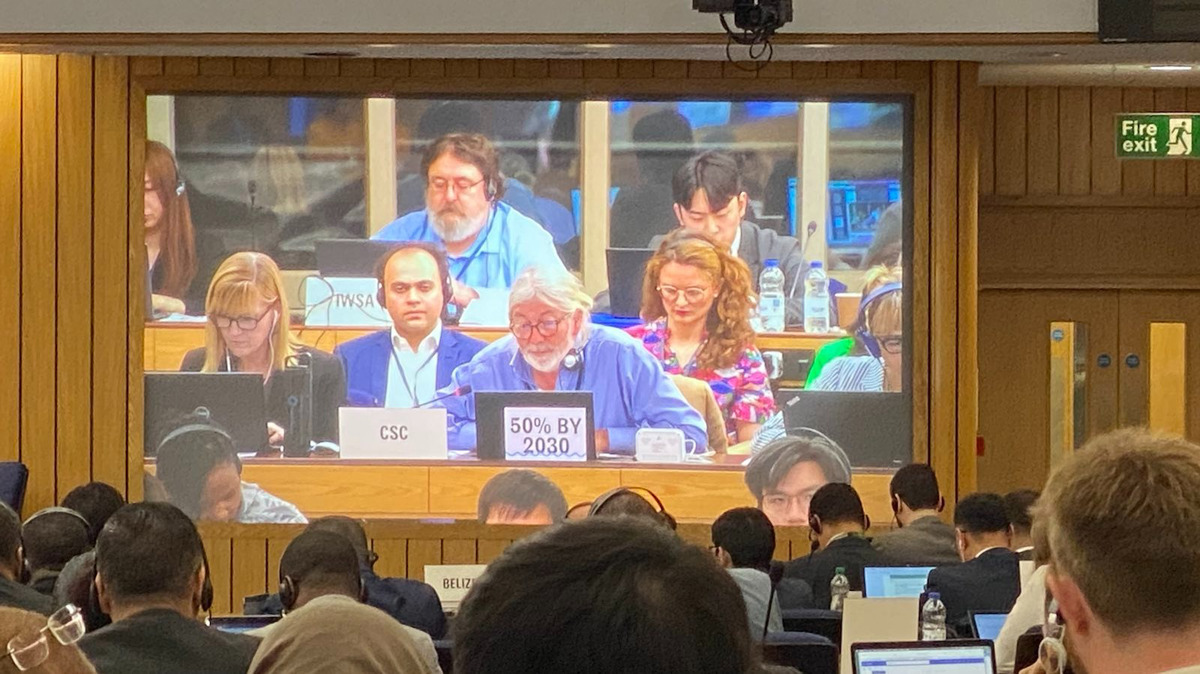MEPC 80: Ambitious interim GHG targets needed to align shipping with Paris Agreement - CSC
The proposed interim greenhouse gas (GHG) reduction target for 2030 will fall short of aligning shipping with the Paris Agreement, John Maggs of Clean Shipping Coalition (CSC) tells ENGINE.
 PHOTO: Members of the Clean Shipping Coalition at the IMO working group meeting last week. CSC
PHOTO: Members of the Clean Shipping Coalition at the IMO working group meeting last week. CSC
The IMO's GHG working group came up with a draft proposal of a 20% reduction in GHG emissions by 2030. The CSC's Maggs says that a target that low will make it impossible for shipping to align itself with the climate targets set in the Paris Agreement in 2015 to limit the global temperature increase to 1.5°C above pre-industrial levels.
John Maggs is president of the environmental NGO Clean Shipping Coalition. The organisation has had observer status at the IMO since 2010. Maggs believes that this interim target will without any doubt be the most critical element in the IMO’s revised GHG strategy.
The IMO’s initial GHG strategy sets out a target to halve maritime GHG emissions by 2050. The maritime regulator is expected to revise this strategy at the 80th Marine Environment Protection Committee (MEPC) meeting this week.
Apart from determining the overall 2050 GHG strategy, discussions are being held to set interim GHG reduction targets for 2030 and 2040. These interim targets are expected to serve as “checkpoints” toward the 2050 target.
Maggs thinks that the interim GHG reduction target for 2030 needs to be anywhere between 37-50% to ramp up shipping decarbonisation. The leading proposal of just 20% from last week's IMO working group meeting would lead shipping to exhaust its Paris-aligned carbon budget by 2031, Maggs claims.
Shipping has potential to reduce its GHG emissions with up to 47% by 2030 using measures such as slow streaming, and energy-efficient retrofits such as wind propulsion, Maggs says, pointing to a study commissioned by CSC. The study was also presented during the working group meeting last week.
Mid-term measures at the IMO
Also during the MEPC this week, member states will determine when mid-term measures will be agreed upon and implemented. These mid-term measures can be economic or technical measures aimed at bridging price gaps between oil-based marine fuels and low- and zero-emission fuels.
According to University Maritime Advisory Services (UMAS), most member states at the working group meeting last week were in favour of setting 2025 as a deadline for adopting mid-term measures.
Adoption of an ambitious target will also pave the way for reviewing the IMO’s short-term measures such as the carbon intensity indicator (CII) ratings given to vessels.
By Nithin Chandran
Please get in touch with comments or additional info to news@engine.online





